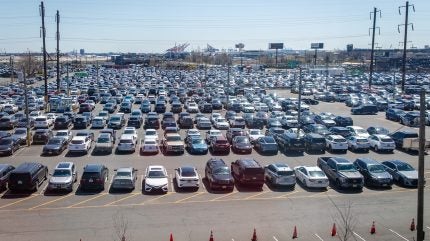
US President Donald Trump is reportedly contemplating the extension of considerable tariff relief for domestic car production.
If implemented, the move could alleviate the financial burdens currently borne by major automotive firms.

Discover B2B Marketing That Performs
Combine business intelligence and editorial excellence to reach engaged professionals across 36 leading media platforms.
The news was disclosed to Reuters by Republican Senator Bernie Moreno, a member of the Senate Commerce Committee with a background in car dealerships, and auto industry officials.
In an interview, Moreno said, “For Ford, for Toyota, for Honda, for Tesla, for General Motors (GM), those are the almost in order of the top five domestic content vehicle producers – they’ll be immune to tariffs.”
In June 2025, the US Commerce Department outlined a plan to introduce an import adjustment offset at 3.75% of the retail price for eligible vehicles manufactured in the country until April 2026, followed by a reduced rate of 2.5% in the subsequent year.
It was intended to mitigate the impact of tariffs on imported automobile components.
Moreno and automotive officials noted that Trump is considering not only maintaining the offset at 3.75% but also extending the duration of the credit to five years and broadening the offset to include US engine production.
Moreno anticipates that the US President will reach a decision on the matter shortly.
When approached for a statement regarding the proposal, a White House official told the news agency that President Trump and his administration “are committed to a nuanced and multi-faceted approach to securing domestic auto and auto parts production.
“Until any official action is signed by the president, however, any discussion about administration policymaking is speculative.”
Trump had implemented 25% auto tariffs on over $460bn worth of vehicle and auto parts imports annually, in May.
However, subsequent agreements have been made to reduce these tariffs with several countries, including the UK, the European Union, and Japan.
In August, the Commerce Department announced an increase in steel and aluminium tariffs on more than 400 products, amounting to $240bn in annual imports, which included a variety of auto parts essential for electric vehicles and buses.
Automakers have yet to respond to requests for comment regarding the potential application of tariff relief to the impacts of aluminium and steel tariffs.
Moreover, Reuters said that the Trump administration has postponed the finalisation of new tariffs on heavy-duty trucks, which were due to take effect this week, as it assesses the potential implementation of new 25% levies.
Last month, Trump signed an executive order to lower tariffs on Japanese automobile imports, among other products.






